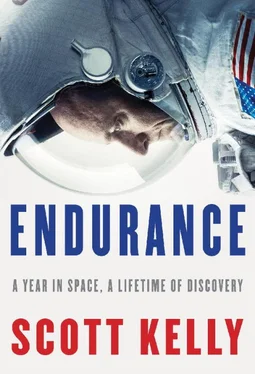Kjell and Kimiya are growing used to the strangely sterile life up here. But at least now we have some plants: we have begun an experiment in the European module growing lettuce in a system that uses LED lights to bathe a plant “pillow” of control-release fertilizer. We are learning more about the challenges of growing food in space, which will be important if humans are to make a journey to Mars.
Because I’ve already spent so much time up here, I’m able to tune in to the subtleties of the station. I can feel a slight temperature change from one side of a module to the other. I can feel the vibration in a handrail changing slightly. The sounds of the equipment—always whirring, humming, buzzing—vary almost imperceptibly. I’ll stop Kjell or Kimiya floating through and ask, “Do you hear that whooshing sound?” Often they won’t have noticed it until after I’ve pointed it out. This hypervigilance isn’t entirely a good feeling. It’s another symptom of not being able to detach and shut down, of never really being off the clock. But it might keep us safer—if something were to start to go wrong I might have an early indication of it.
I recently noticed that my brain has made a transition to living in zero g—I can now see things in all orientations. If I’m “upside down” relative to the module I’m in, instead of the environment looking foreign and disorienting, as it would if you stood on your head in an equipment-packed laboratory on Earth, now I immediately recognize where I am and can find whatever I need. This is a transition I never made last time, even after 159 days in space. This may have to do with the six weeks I spent by myself on the U.S. segment—without seeing another astronaut oriented in the normal “upright” way, I was maybe better able to adapt. Or it may be that this is a transition that takes the human brain more than six months to complete. If so, I may have found one of the answers, albeit a small one, that Misha and I are here in search of.
I’ve been noticing that Misha has a different philosophy of pacing himself through the year than I do—he often announces the exact number of days we still have to go, which bugs the shit out of me, but I keep that to myself. I prefer to count up rather than counting down, as if the days are something valuable I’m collecting.
—
TODAY I AM doing a Twitter chat, answering questions from followers “live.” Because my internet connection can be slow, I’m dictating my answers to Amiko and another public affairs person, and they are typing them into Twitter almost in real time. I’m answering the usual questions about food, exercise, and the view of Earth when I receive a tweet from a user with the handle @POTUS44, President Obama.
He writes, “Hey @StationCDRKelly, loving the photos. Do you ever look out the window and just freak out?”
Amiko and I share a moment of being pleased that the president is following my mission. I think for a moment, then ask Amiko to type a reply: “I don’t freak out about anything, Mr. President, except getting a Twitter question from you.”
It’s a great Twitter moment, unplanned and unscripted, and it gets thousands of likes and retweets. Not long after, a reply appears from Buzz Aldrin: “He’s 249 miles above the earth. Piece of cake. Neil, Mike & I went 239,000 miles to the moon. #Apollo11.”
There is no good way to engage in a Twitter debate with an American hero, so I don’t. In my mind, I reflect on the fact that the crew of Apollo 11 spent eight days in space, traveling half a million miles; by the time I’m done I will have spent a total of 520 days in space and will have traveled over two hundred million miles, the equivalent of going to Mars and back. Only later, when the Twitter chat is over, do I have the chance to reflect that I just experienced being trolled, in space, by the second man on the moon, while also engaging in a Twitter conversation with the president.
A few days later, it’s time to harvest the lettuce we’ve been growing. Kjell, Kimiya, and I gather in the European module to eat it with some oil and vinegar, and it’s surprisingly good. This is the first time American astronauts have eaten a crop grown in space, though the Russians have grown and eaten leafy greens on previous missions. As often happens, the public reaction to the space lettuce surprises me—people seem to be fascinated by the idea of growing and eating plants in orbit, while at the same time Misha and Gennady are outside doing a spacewalk that gets no attention in the United States whatsoever. Kimiya confides in me later that he had to force himself to eat the lettuce for the camera—he grew up on a lettuce farm, and in the summer he had to get up in the middle of the night to harvest it, so since then he’s hated lettuce.
That evening, we bring the Russians some lettuce to sample for Friday dinner. The main topic of discussion is the Soyuz that will be coming up soon, bringing our total to nine. We talk about the new guys—Sergey, Andy, and Aidyn—and I mention that I’ve never met Aidyn and don’t even have an idea of what he looks like. That’s incredibly unusual: before flying in space with someone, even someone from another country, you normally train with him or her, if only a little.
Gennady offers to show me a picture. I decide it will be fun if I have no idea what he looks like until he comes floating through the hatch. Oleg and Gennady agree this will be entertaining.
At about one a.m. I’m awakened from a dead sleep by the failure of one of our power channels. The outage takes down half the power in Node 3, which is where we keep most of our environmental control equipment—our O 2generator, one of the Seedras (the one I hate), and all the equipment that processes our urine into water, including the toilet itself. It takes a couple of hours working with the ground to get things under control, at which point I tell the rest of the crew to go back to sleep. I stay up another hour and a half myself as the ground attempts to regain ventilation and smoke detection capability. The culprit turned out to be a power regulator way out on the truss. By the time I get back to my CQ, I know I’ll only get a couple of hours of sleep at most.
Later, when I talk to Amiko, she tells me she was in mission control when the power went down. It hadn’t occurred to me that she might have been there on console, watching the displays light up like a Christmas tree with our power failure. We haven’t talked much about the fact that her job at NASA could potentially put her in the strange position of watching live while some disaster threatens her partner’s life.
“I bet that was scary,” I say.
“Yeah, it was a bit scary,” she says. “But I stayed on console until I could see that everything was okay.” She tells me that soon after, the lead flight director Mike Lammers came by her console to see how she was doing. Mike was also the lead flight director for the second half of my previous mission to ISS; he is someone I trust, the person I always think of as my space station flight director. He has also set himself apart from many of the other flight directors in mission control by checking on Amiko, congratulating her on the accomplishments of the mission so far, and supporting her as my partner.
The next day, I talk to Charlotte on the phone. She’s still not much of a phone person, and as usual she seems to be distracted by something, maybe the TV. She’s never rude or unfriendly, but her answers are brief and vague. After a while I run out of topics and start wrapping up the conversation.
“Okay, I should get going,” I say. “Just wanted to check to see how you were doing.”
I expect her to answer with a good-bye, but instead there is a pause. For a second, I wonder whether we have lost our connection.
Читать дальше












